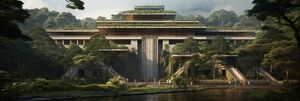Restoration Coalition
| Restoration Coalition RC | |
| Logo | Flag |
|---|---|
| [[File:|150px]] | [[File:|150px]] |
| Motto: "Here We Were, Here We Will Be, Here We Are" | |
| Anthem: "TBC" | |
| Headquarters | |
| Chalkam - Chaska | |
| Official languages | Remana, Arvorian, Bahaso Sokoku |
| Membership | TBC |
| Secretary-General | TBC |
| Establishment | |
| Founded | 7621 RH |
| Goals | |
| The RC's primary goal is to permit the rebuilding of post-colonial states without undue reliance on their colonizers for resources and infrastructure. | |
| Organization Type | |
| Intergovernmental | |
| Map of Members | |
| [[File:|300px]] | |
The Restoration Coalition (Remana: Mushuqyanapaq Allichana) is an international organization dedicated to the unification and reconstruction of post-colonial states. Founded in 7621 RH, the Coalition has headquarters in the Chaskan city of Chalkam, where the first accords were signed between Chaska, Arvor, and Sokoku, among others.
Member States
| Member nation flag | Member nation | Joining data | Agenda analysis |
|---|---|---|---|
| Arvor | 7621 RH | Arvor sees the Coalition as an important instrument through which post-colonial states can work together for their mutual betterment. While not itself post-colonial, the ADR's socialist system opposes colonialism and imperialism, and it uses its influence and place within the Coalition to support the member nations. | |

|
Chaska | 7621 RH | Chaska places a great deal of importance on the Coalition, both nationally and internationally. Among other things, they act as the current headquarters for the organization. |

|
Sokoku |
Funding
The Coalition receives funding both from member states and from wealthy benefactors within them, or from outside. The benefactors can not expect to influence the goals of the Coalition; however, within and among member-states they are accorded greater popularity, which may be beneficial in other business.
Location

The official site of the Restoration Coalition is the House of Honour in Chalkam, a complex built in the 7650s to replace the older House of Honour bearing the same name. The building is in the modern Chaskan pichalli style, which involves a clear break from any of the colonial styles that held some sway in the region for around two hundred years, preferring a mixture of simple shapes, references to traditional architecture, and much in the way of botanical additions.